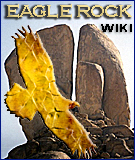Chemistry
From eagle-rock.org
| Chemistry | |||
|---|---|---|---|
|
| |||

| |||
| Caption: | Periodic table of the chemical elements | ||
Higher topic: Science
Underlying topic(s):
Underlying topic(s):
- LiveScience.com: Chemistry is the study of matter, its properties, how and why substances combine or separate to form other substances, and how substances interact with energy. Every material in existence is made up of matter — even our own bodies. Chemistry is involved in everything we do, from growing and cooking food to cleaning our homes and bodies to launching a space shuttle. Chemistry is one of the physical sciences that help us to describe and explain our world.
- There are five main branches of chemistry.
- - Analytical chemistry uses qualitative and quantitative observation to identify and measure the physical and chemical properties of substances.
- - Physical chemistry combines chemistry with physics. Physical chemists study how matter and energy interact. Thermodynamics and quantum mechanics are two of the important branches of physical chemistry.
- - Organic chemistry specifically studies compounds that contain the element carbon. Organic chemistry is known as the “Chemistry of Life” because all of the molecules that make up living tissue have carbon as part of their makeup.
- - Inorganic chemistry studies materials such as metals and gases that do not have carbon as part of their makeup.
- - Biochemistry is the study of chemical processes that occur within living organisms.[1]
- Wikipedia: Chemistry is a branch of physical science that studies the composition, structure, properties and change of matter. Chemistry includes topics such as the properties of individual atoms, how atoms form chemical bonds to create chemical compounds, the interactions of substances through intermolecular forces that give matter its general properties, and the interactions between substances through chemical reactions to form different substances.
- Chemistry is sometimes called the central science because it bridges other natural sciences, including physics, geology and biology.[2]
